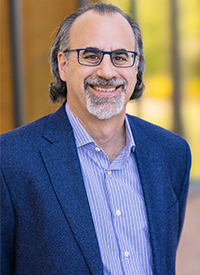
Stephen M. Fiore, Ph.D.
Joint Faculty
Professor
Director, CSL
Lab:
Office:
Partnership 2: 140A
Contact:
407-882-0298
sfiore@ucf.edu
Dr. Stephen M. Fiore is Director, Cognitive Sciences Laboratory, and Professor with the University of Central Florida's Cognitive Sciences Program in the Department of Philosophy and School of Modeling, Simulation, and Training. He maintains a multidisciplinary research interest that incorporates aspects of the cognitive, social, organizational, and computational sciences in the investigation of learning and performance in individuals and teams. His primary area of research is the interdisciplinary study of complex collaborative cognition and the understanding of how humans interact socially and with technology.
He is Immediate Past President of the International Network for the Science of Team Science, and Past President for the Interdisciplinary Network for Group Research. In 2018, Dr. Fiore was nominated to DARPA's Information Sciences and Technology (ISAT) Study Group to help the DoD examine future areas of technological development potentially influencing national security. He has been a visiting scholar for the study of shared and extended cognition at École Normale Supérieure de Lyon in Lyon, France (2010) and an invited visitor to the internationally renowned interdisciplinary Santa Fe Institute (2013). He was a member of the expert panel for the Organisation for Economic Co-operation and Development's 2015 Programme for International Student Assessment (PISA) which focused on collaborative problem-solving skills. He has contributed to working groups for the National Academies of Sciences in understanding and measuring "21st Century Skills" and was a committee member of their "Science of Team Science" consensus study, as well as a member of the National Assessment of Educational Progress report on "Collaborative Problem Solving".
He has been awarded UCF’s prestigious Research Incentive Award four times to acknowledge his significant accomplishments. And he is recipient of UCF's Luminary Award (2019), as recognition for his work having a significant impact on the world, and UCF's Reach for the Stars Award (2014), as recognition for bringing international prominence to the university. As Principal Investigator and Co-Principal Investigator he has helped to secure and manage approximately $35 million in research funding. He is co-author of a book on “Accelerating Expertise” (2013) and is a co-editor of volumes on Shared Cognition (2012), Macrocognition in Teams (2008), Distributed Training (2007), and Team Cognition (2004). Dr. Fiore has also co-authored over 200 scholarly publications in the area of learning, memory, and problem solving in individuals and groups.
Education
Research Interests:
Advanced Learning and Training Technologies
Cognitive Factors
Human Factors Design
Human Performance
Human-human Teams
Measuring Performance and Team Processes
Simulation-Based Training
Team Cognition
Team Performance
Team Performance Models
Team Science
Training for High-Consequence Industries
Areas of Expertise:
Cognitive Science
Complex Collaborative Cognition
Computational Science
Organizational Science
Psychometrics
Simulation and Training
Social Science
Application Areas:
Academics
Defense
Education
Human Factors
Space
Training
